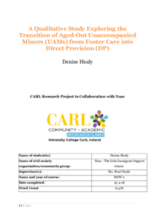Displaying 621 - 630 of 991
In this paper, the authors examine the reunification patterns of children left‐behind by parents who migrated to France and Spain in order to understand whether children from standard two‐parent families differ in their chances of joining their migrant parents in the destination country compared to children in non‐standard families (single parent and blended families), as well as the potential role of immigration policies on these chances.
This article looks at the interaction between transnational family relationships, on the one hand, and family-related immigration policies, on the other.
This paper serves to illustrate challenges in research on care-leavers and the various ways that research results can be interpreted by drawing on data from a study being conducted in a residential care programme in South Africa.
This article examines the care experiences of former looked‐after children from a residential care setting in South Africa.
This study used ethnographic data to examine a program providing subsidized apartments to youth aging out.
This video features interviews and presentations from a seminar that took place in Nairobi, Kenya in March 2018 which brought together orphanage directors to discuss the importance of children growing up in safe and loving families and the need to transition models of care.
This paper uses person-centered latent class analysis (LCA) methods to examine the relationship between different profiles of ACE exposures and divergent health trajectories amongst this high-risk population.
This is a small-scale study examining the experiences of Aged-Out Unaccompanied Minors (UAMs) who transition from foster care into Direct Provision (DP) in Ireland.
The goal of this study was to explore the assets and pathways in pursuing the future goals of 25 care leavers in Israel.
The goal of the article is to analyze the characteristics and experiences of youths when they leave care and their first years in transition from foster care to adulthood.

